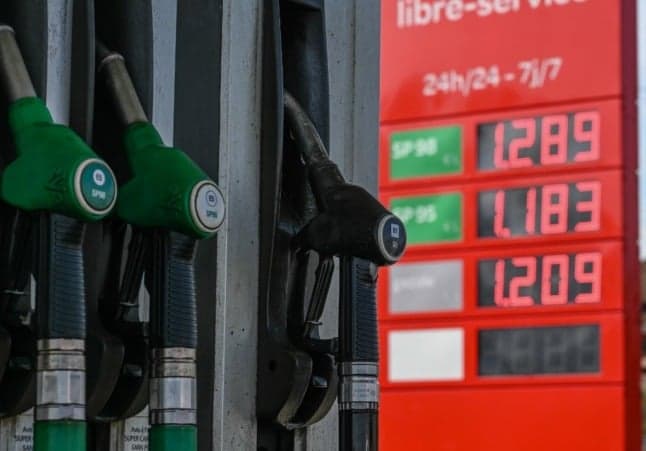Why fuel prices are rising in France (and why that might worry Macron)

Some bad news for motorists - fuel prices in France have increased by 16 percent for petrol since the beginning of the year, while diesel prices are up 12 percent.
A litre of diesel cost €1.43 in the second week of August, while super unleaded petrol cost €1.59, according to the French Ministry of Ecological Transition.
Prices had fallen all the way to €1.16 for diesel and €1.23 for petrol at the height of the pandemic in May 2020 as rising Covid cases brought the world to a standstill.
"We are simply returning to prices recorded just before the pandemic," Olivier Gantois, president of the Union française des industries pétrolières (French Union of Petroleum Industries) told Le Parisien.
"Since French fuel prices are made up of 60 percent taxes, it's the non-tax part - and so the international markets - which is influencing the variations."
Brent crude oil prices - the global reference for oil prices - fell below $20 the barrel in April 2020, but have increased as the global economy has gotten going again. A barrel cost $73 in June and $74 in July.
But while President Emmanuel Macron will be keeping a close eye on developments, since the cost of living has been a key complaint during protests since he came to power, fuel prices have not quite reached the levels seen in recent years.
Prices reached €1.53 for diesel and €1.57 for petrol in October 2018, a month before the first 'Yellow Vest' protests began and the cost of driving (essential for those in remote areas with limited public transport options) became a key rallying cry of the movement, from extra green fuel taxes to speed limits on rural roads.
Alberto Balboni, an economist with private research institute Xerfi, told AFP fuel prices should stabilise at around $70 per barrel "between now and the end of the year or even beyond, because at that price, few producers will want to sacrifice part of their production in order to push prices even further, which would risk discouraging demand."
Other experts have warned that further fluctuations cannot be rules out depending on the health situation.
In the case of petrol, there are other possible explanations beyond the evolution of the pandemic.
"In the summer, there is always an inflation of petrol because it's the holiday season in the United States, where it's in great demand," Francis Pousse of the Conseil national des professions de l'automobile told AFP.
For drivers of diesel vehicles visiting from the UK it's still worth filling up in France, since diesel is significantly more expensive in the UK at an average of 137.2p or €1.60 per litre.
Unleaded petrol prices are virtually identical, 135.3p or €1.58 per litre, compared to €1.59 in France.
Comments (1)
See Also
A litre of diesel cost €1.43 in the second week of August, while super unleaded petrol cost €1.59, according to the French Ministry of Ecological Transition.
Prices had fallen all the way to €1.16 for diesel and €1.23 for petrol at the height of the pandemic in May 2020 as rising Covid cases brought the world to a standstill.
"We are simply returning to prices recorded just before the pandemic," Olivier Gantois, president of the Union française des industries pétrolières (French Union of Petroleum Industries) told Le Parisien.
"Since French fuel prices are made up of 60 percent taxes, it's the non-tax part - and so the international markets - which is influencing the variations."
Brent crude oil prices - the global reference for oil prices - fell below $20 the barrel in April 2020, but have increased as the global economy has gotten going again. A barrel cost $73 in June and $74 in July.
But while President Emmanuel Macron will be keeping a close eye on developments, since the cost of living has been a key complaint during protests since he came to power, fuel prices have not quite reached the levels seen in recent years.
Prices reached €1.53 for diesel and €1.57 for petrol in October 2018, a month before the first 'Yellow Vest' protests began and the cost of driving (essential for those in remote areas with limited public transport options) became a key rallying cry of the movement, from extra green fuel taxes to speed limits on rural roads.
Alberto Balboni, an economist with private research institute Xerfi, told AFP fuel prices should stabilise at around $70 per barrel "between now and the end of the year or even beyond, because at that price, few producers will want to sacrifice part of their production in order to push prices even further, which would risk discouraging demand."
Other experts have warned that further fluctuations cannot be rules out depending on the health situation.
In the case of petrol, there are other possible explanations beyond the evolution of the pandemic.
"In the summer, there is always an inflation of petrol because it's the holiday season in the United States, where it's in great demand," Francis Pousse of the Conseil national des professions de l'automobile told AFP.
For drivers of diesel vehicles visiting from the UK it's still worth filling up in France, since diesel is significantly more expensive in the UK at an average of 137.2p or €1.60 per litre.
Unleaded petrol prices are virtually identical, 135.3p or €1.58 per litre, compared to €1.59 in France.
Join the conversation in our comments section below. Share your own views and experience and if you have a question or suggestion for our journalists then email us at [email protected].
Please keep comments civil, constructive and on topic – and make sure to read our terms of use before getting involved.
Please log in here to leave a comment.